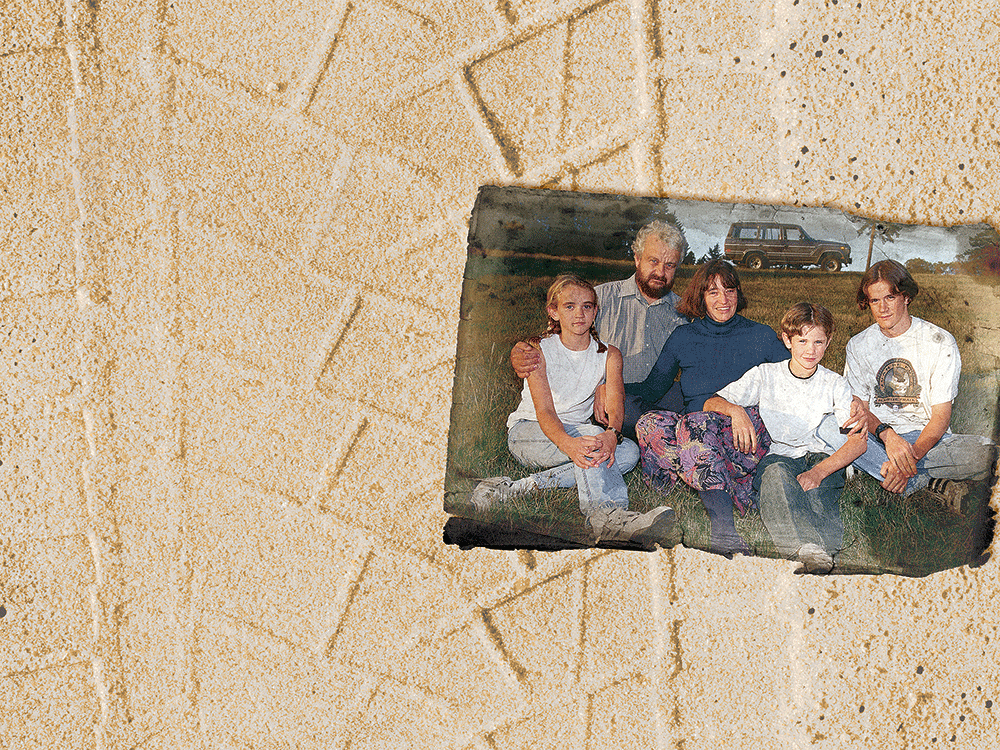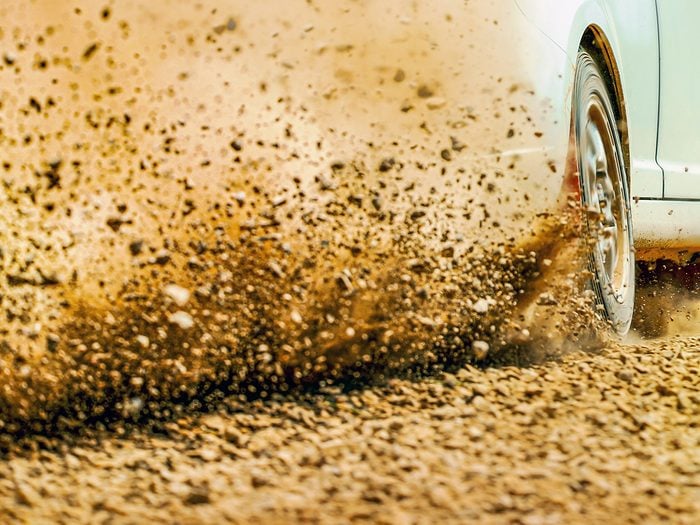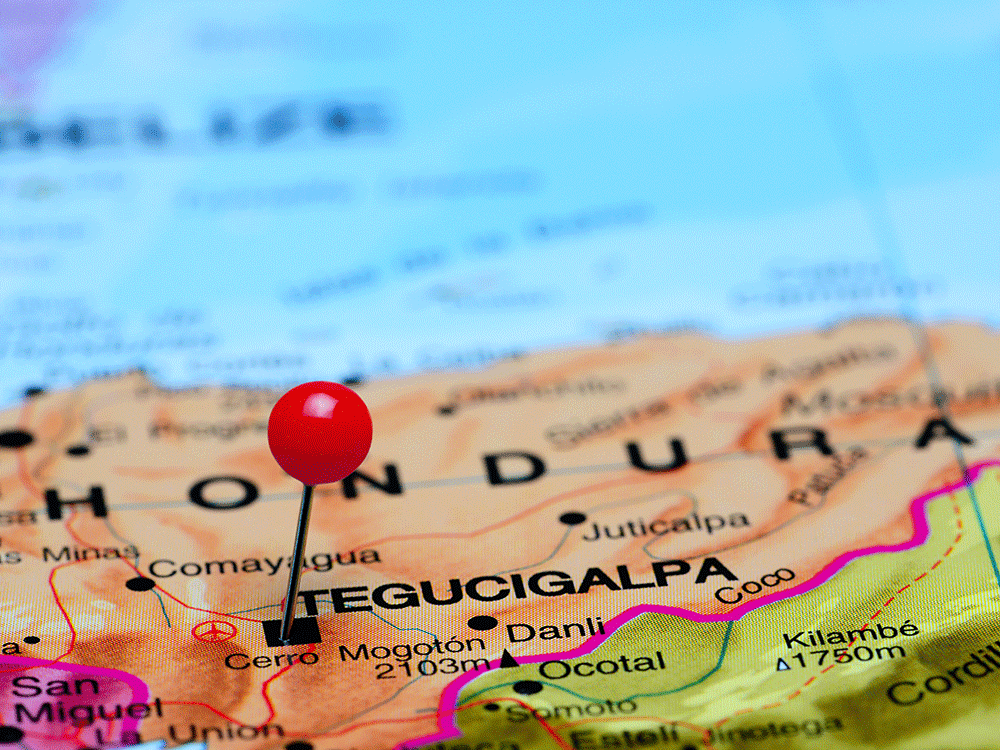
Violent Encounter
“Looks like a breakdown,” said Wally Eamer, swinging his grey Toyota Land Cruiser around the dilapidated truck blocking the road’s single lane. His wife, Sharleen Thompson, peered warily at the five men in and around the vehicle. Breakdowns were common on the dusty highways of central Honduras, but so were chances of a roadside robberies.
Helping others came naturally to the Victoria, B.C., couple. Sharleen, 45, was teaching first aid in remote Honduran villages, while 48-year-old Wally, a British Columbia parks director on a leave of absence, was using his management skills to aid small businesses. Their year-long stint in a Central American volunteer program affiliated with the Anglican Church of Canada would, the couple had decided, provide the experience of a lifetime for their three children: Gil, 14, Gwen, 11, and Struan, 8.
“What’s the problem?” Wally asked the group in Spanish as they drove by on the afternoon of January 3, 1998.
“It won’t start,” said one of the men. Wally considered the situation: it was 1:15 p.m. and hot—and getting hotter. It might be hours before another vehicle came along. Besides, the local police had assured them their chosen route for a week’s holiday in the Caribbean Bay Islands was safe.
“Stay in the car. I’ll see if I can help,” Wally told his wife and kids, taking the precaution of pulling up 30 metres ahead. Leaving the engine running, he walked over to greet the men.
While Wally checked under the hood, a small, wiry man sauntered up to the Land Cruiser, stopping at the passenger side. Smirking, the stranger drew a .22-calibre semi-automatic from a hip holster and pointed it at the children in the back seat. Gwen threw up her hands to ward off the gun while Struan shrank behind his big brother. “No!” Sharleen shouted as she rolled up the window.
Wally whirled around at his wife’s cry. He approached the gunman, who pointed the pistol in his direction. “Come,” Wally commanded, walking to the rear of the Land Cruiser. The man followed, his gun levelled at Wally’s chest.
“Give me your guns,” the man demanded. His assumption was reasonable; anyone in Honduras who could afford an expensive vehicle would likely have a gun to protect it.
“No,” Wally said, shaking his head. He figured if the attackers realized the family was unarmed, they’d do as they pleased—robbers were known to kill their victims, leaving no witnesses. The man backed up to the rear passenger window and again pointed his weapon at the children.
“I want your guns and money,” he growled.
Desperate to get the kids out of the line of fire, Wally yanked open the rear door on the driver’s side and ordered the children out. They stood by the wheel well, the Land Cruiser’s body shielding them from the gunman. Wally walked back behind the car and again motioned the robber over. He had a plan.
In their 20 years of marriage, Wally and Sharleen had taken many adventure trips, and their teamwork had gotten them out of tight spots in the past. For their time in Honduras, they had devised a strategy in case they were assaulted: each would try to get the children to safety, even if it meant leaving the other behind.
As the gunman focused on Wally, again demanding guns and money, Sharleen slipped behind the wheel and the kids quietly climbed back in. Her eyes on the rear-view mirror, Sharleen prayed her husband could talk his way out.
Suddenly, the robber became more agitated. A man at the truck grabbed his bag to leave, not wanting to witness what was going to happen. Go now, Sharleen! Wally pleaded silently.
The gunman took three steps back, aimed and fired. Wally spun and dropped to his knees, crying out, clutching his groin as searing pain shot through his body.
Sharleen knew she should speed off, but she couldn’t bring herself to leave the man she loved to die. She ran back to where he lay sprawled on the ground, one arm on the vehicle’s bumper and blood seeping from between his legs.
The gunman had turned his back to them, waving his pistol and shouting at the other men. He had disabled the driver and could take his time. Few women in Honduras drive, and it didn’t occur to him that Sharleen would know how.

Escape at All Costs
“We’ve got to go,” she urged Wally, dragging him toward the car. With his wife supporting him, Wally hopped to the door on his good leg and climbed in on top of the kids.
Sharleen got into the driver’s seat and threw the Land Cruiser into gear. She willed herself not to look back, concentrating on a left-hand bend just ahead. If I’m shot, Gil will have to take over once we’re around that corner, she thought.
Looking back, Gil saw the robber whirl at the sound of the revving motor. The man’s face contorted with rage and he sprinted after the vehicle. He caught up to the open rear window and fired wildly. Gil ducked as a bullet thudded into the top of the front passenger seat. Another bullet zipped through Sharleen’s plastic seat belt cover, just missing her thigh. Empty cartridge casings spewed over Struan as a third slug plowed into the metal window frame. Then the gunman was left behind, still trying to shoot at the Land Cruiser.
Sharleen skidded around the corner and shouted, “Is anyone hit?”
“Nobody,” Gil assured her.
The children stared at their father, who was pressing his hand to the widening stain of blood soaking his white shorts. The bullet had glanced off the bone, severing both the femoral artery and vein. Without pressure on these major blood vessels, Wally would bleed to death within minutes.
“Get pressure on his wound!” Sharleen ordered, flooring the gas. Gil pushed down with both hands on top of his father’s. Wally grimaced in pain, his eyes rolling back in his head.
Months of helping out with their mother’s first-aid sessions were paying off. Gwen was about to breathe air into her father’s lungs when, to her relief, his eyes fluttered open.
“Dad’s conscious!” Gwen yelled. “Okay, press as hard as you can,” Sharleen urged. Gwen jammed her elbow down on top of Gil’s and Wally’s hands, but blood spurted between their fingers and soon soaked the seat.
Sharleen drove as fast as she dared. After 10 minutes, she skidded to a halt at a fork in the road. A wrong turn would cost Wally his life. Then she spotted a little restaurant with people sitting around. “Which way to Juticalpa?” she yelled, aware that the city was the site of the nearest hospital. A young man approached. Shocked by the sight of Wally and three children covered in blood, he pointed down the left side of the fork.
Sharleen took off, wheels spinning. God, we really need you now, she prayed. There was nothing she could do for Wally but drive. It was up to the kids to keep their father alive.
Wally had never felt such pain. “Give me something to bite on,” he told Struan. Rummaging around, Struan found Wally’s red address book. As he watched his father bite down hard, he bent forward and kissed his forehead. “I love you, Daddy. Please don’t die,” he pleaded.
“I’ll do my best,” Wally said, but he knew he was badly wounded. “Roll down the window and put my good leg out,” he said, hoping that raising his right leg would get more blood into his torso. Gil and Gwen struggled to lift his leg and brace it on the window frame. For a few minutes, Wally felt a little better, but soon numbness crept up from his legs into his arms.
After another 10 minutes of driving, Sharleen flagged down a truck, and a passenger volunteered to guide them to the hospital. In Juticalpa, as they raced down side streets, horn blaring, people leaping out of the way, Wally said weakly, “I don’t think I can last another five minutes.”
“You can do it, Dad. It won’t be much longer,” Struan urged. Gasping for air, his breathing laboured, Wally felt himself slipping away.
Two blocks from the hospital, Sharleen screeched to a halt behind a pickup truck waiting at a red light. She leaned on the horn. “Get out of the way!” she screamed in frustration. The truck didn’t move.
“Hang on,” she muttered. Rolling forward, she nudged the truck’s rear bumper. It still didn’t budge. Revving her engine, she pushed the truck to the side of the road and roared past.
Thirty minutes after the shooting, the family turned through the gates of the small rural hospital.
Wally’s face was ashen as two orderlies rushed him into the emergency room.
“What blood type are you?” a doctor asked as she cut off his shorts and started an IV drip of saline solution to raise his blood volume.
“A negative,” he croaked.
The doctor looked at Sharleen. “I’m so sorry. We don’t have any. You will have to go to Tegucigalpa,” she said, applying a pressure bandage.
Sharleen was stunned. “But that’s over two hours from here!” she protested. The doctor told her there was no other way.
At 3 p.m., after more than an hour at the hospital, Wally was wheeled aboard an ambulance. His leg was tightly bandaged from groin to toe. Two pints of saline—the hospital’s last—dripped into his arm. The simple clinic hospital had no attendants for the trip, so Gil and Gwen rode in the back with Wally while Sharleen and Struan followed in the Land Cruiser.
“Whatever you do, keep him talking,” Sharleen implored her children. “Don’t let him go into shock.”
Before they could take off, however, they learned that the ambulance was out of gas. Sharleen paid the $40 to fill the tank. Then, finally, lights flashing, they roared off through the winding countryside toward the Honduran capital.

Race Against Time
The external bleeding had slowed to a trickle, but internal bleeding soon swelled Wally’s leg and scrotum, and he writhed in agony. Gwen and Gil watched the two bags of saline disappear at an alarming rate.
After half an hour, Wally’s saline ran dry and his IV line turned red with blood. They had no choice but to turn it off.
Thirty minutes later, Wally began to shiver uncontrollably. Gwen yelled at the driver to pull over. She and Gil saw that their father’s face had gone white and his eyes had dilated. They realized he was going into shock. “We need blankets, water and painkillers!” the children called to their mother.
Once they had covered their father with blankets, the ambulance headed off again. Wally gritted his teeth in agony, his leg having ballooned to twice its normal size. Whenever he felt blackness closing in, he heard his children’s voices: “You’re okay, Daddy. Don’t go unconscious.”
Wally’s head rocked back and forth as he mumbled in Spanish, “God, please protect my family.”
“Dad! Dad! Wake up!” Gil shouted. But Wally felt himself being drawn into a peaceful place. He couldn’t think of a better way to die, with his family around him. Then he remembered where he was. You promised the kids you’d try, he scolded himself, fighting his way back to consciousness.
Siren blaring, the ambulance sped through the hilly streets of Tegucigalpa. At 5:30 p.m.—more than four hours after the shooting—the family arrived at the hospital. None of the staff preparing Wally for surgery could believe he had survived for so long. He had lost half the blood in his body.
“I’ll do my best,” vascular surgeon José Carlos Alcerro Diaz told Sharleen, “but I don’t know if we can save his life, much less his leg.”
In the operating room, Alcerro Diaz clamped off the bleeding artery and vein. Both were badly torn. He carefully sutured the damaged ends of the vein, then began the delicate task of stitching a four-centimetre artificial graft to join the destroyed ends of the artery.
After more than two hours, the surgeon held his breath as he removed the clamps, then grinned with relief as blood flowed into Wally’s swollen leg.
By the next day, the patient was stable and his children were allowed to see him. They entered Wally’s room one at a time, and he gripped their hands. “Thanks for being there for me,” he said.
Nine days later, a boil appeared on his buttock. “That’s no boil. That’s the bullet,” Sharleen declared. It was removed, and 24 hours later Wally left the hospital on crutches.
Wally’s recuperation in Honduras lasted long enough for Sharleen to oversee another four first-aid courses. By February, one month after the shooting, he could limp a kilometre, and the family drove to the Caribbean Bay Islands—sticking to the main highway—for the holiday they’d missed. They returned home to B.C. in March.
The Canadian Embassy reported the crime to the Criminal Investigation Branch in Juticalpa. Armed with the Eamers’ description of the gunman, the police conducted an investigation, but the robber was never caught.
Wally Eamer kept the dented bullet that nearly killed him as a reminder of his good fortune.
“You have to be proud of kids who saved your life,” he says, smiling.
Check out more Drama in Real Life from the pages of Reader’s Digest Canada.